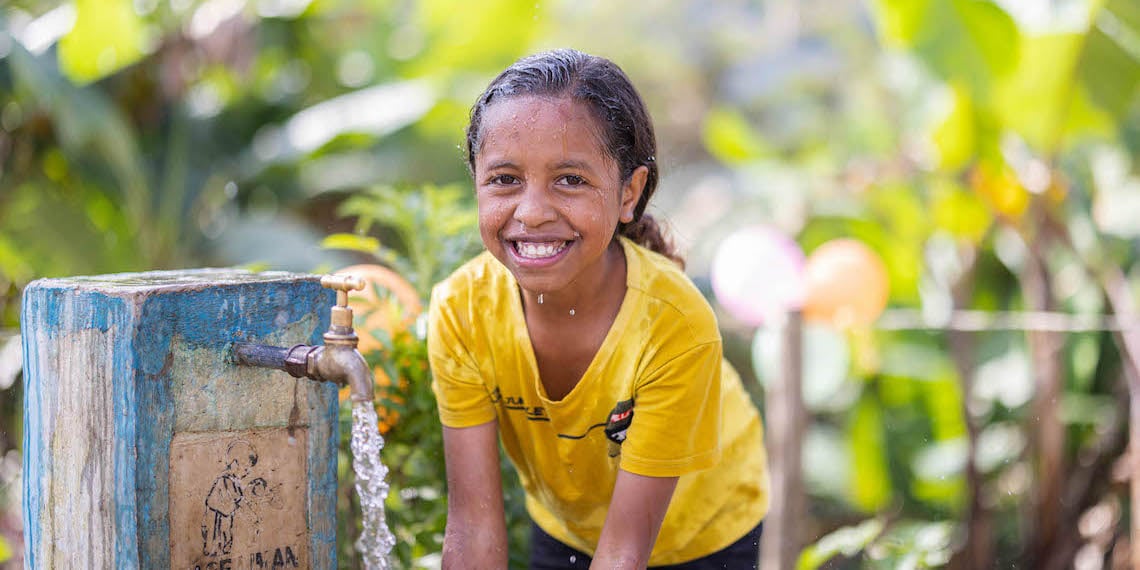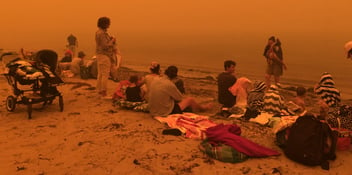Our Water Stories: tackling lack of access to WASH with context-based solutions

National Water Week has finally arrived, and to celebrate this year’s theme – Our Water Stories – we asked WaterAid Australia to explain how they work to provide access to water, sanitation and hygiene (WASH) in some of the world’s most marginalised communities.
With 771 million people currently living without access to clean water – 1 in 10 people globally – the WaterAid water story is all about advocating the water stories of others, particularly through Walk for Water, an annual event hosted by WaterAid to raise much-needed funds for crucial WASH projects.
While WaterAid has become very well-known for its excellent advocacy work today, WaterAid's acting CEO Tom Muller said the organisation’s story started in the UK in 1981 as a means to fill a critical gap in water-related developmental aid programs.
“Back then, the international development space lacked focus on water, sanitation and hygiene. People working in the UK engineering world recognised that there was a critical need for a direct and sustained focus on access to safe water,” he said.
“Within the Australian development context, the same thing happened in 2003. There was no single actor really honing in on WASH challenges faced by our Pacific neighbours. With the leadership of Grant Hill and Tony Kelly, WaterAid Australia was formed.”
Fast forward a few decades, and WaterAid is now working in 28 different countries around the world, with WaterAid Australia fundamentally focused on Timor-Leste, Papua New Guinea and Cambodia.
“Despite how far we’ve come, there are still 771 million people around the world today who don't have access to clean water. Fundamentally, our work at WaterAid is about tackling this injustice,” he said.
“Our water story is really all about addressing this issue, but also recognising that water injustices are about sanitation and hygiene as well. And so we advocate for all three, because we must address all three to achieve health and economic benefits for communities most in need.”
Context is key
Working in Papua New Guinea and Timor-Leste since 2004, and Cambodia since 2013, Muller said WaterAid Australia has always focused on targeted, context-sensitive projects working at a community level, but has recently shifted towards addressing the entire WASH system too.
“For us, it’s not just about providing once-off access to water. It’s about considering all of the particulars of ensuring it’s sustainable, which requires a very close understanding of context,” he said.
“How do people within a certain community get access to water, sanitation and hygiene? What do they need to be able to sustain that access? Who pays for the service? Who pays for operation and maintenance? These are crucial questions to address.
“We work with sub-national government and civil society partners to make sure projects create sustainable benefits. In northern Papua New Guinea, we work with the East Council of Women and have facilitated their involvement in district planning for WASH access.
“Likewise, in Timor-Leste we've had a long focus on a couple of sub-national government areas. One of the things we are really proud of is that communities in these sub-national government areas are now open defecation free. It takes dedication and commitment, but to get to the point where entire communities now have access to toilets and clean water is a huge achievement.”
Muller said WaterAid Australia’s Cambodia team has been doing similar work in a number of different provinces, with a recent key focus on Kandal Province.
“Over the last two years, the team has worked with the Kandal provincial government to accelerate access to clean water and toilets. Kandal is one of the first provinces in Cambodia that will achieve open defecation free status,” he said.
While WaterAid’s work starts with context-based access to WASH, Muller said the not-for-profit has also expanded its focus to consider how to support communities and local governments to engage with national government partners around climate change.
“In Timor-Leste, we're been engaging with the Secretary of State for the Environment around COP27, particularly around how WASH fits within national climate adaptation plans,” he said.
“Another important aspect of where we are at in our water story is learning that committing to community-level projects is important, but, if we really want to engender scalable change, we need to be working to influence national governments and private-sector organisations that operate in the countries where we work.”
Story highlights
Some of WaterAid’s proudest moments in its journey thus far have been reacting to critical needs. Muller said COVID-19 presented a huge WASH hurdle, one the organisation was very proud to help mitigate.
“One of the things we are most proud of from the past couple of years has been the way our teams have responded to the pandemic. They’ve adapted their ways of working and, importantly, have been key to engaging with messaging around hand hygiene,” he said.
“There has been a huge effort in Timor-Leste, Papua New Guinea and Cambodia, but also across other countries where WaterAid works, including India, Bangladesh, Pakistan, Ethiopia, Nigeria and Mozambique, to really focus on supporting government in hand hygiene messaging as a first response to COVID-19.”
WaterAid’s hygiene campaigns reached 181 million people, distributed 1.8 million hygiene products, including soaps and sanitisers, and delivered 2700 large-scale innovative hand washing facilities in key public places.
Aside from helping governments promote WASH during the pandemic, Muller said another aspect of WaterAid’s work that’s particularly important is to promote WASH for menstrual health and hygiene.
“There is also a lot of stigma around menstrual health and hygiene in some of the countries we work with. We’ve been working with a range of Pacific women's rights groups to support their advocacy to Pacific government partners around the need to have a more coordinated response to tackling taboos,” he said.
“WaterAid Australia has not only focused on menstrual health, but we are also a strong advocate for gendered water issues. We know a lot of people can’t have access to WASH unless barriers to women's participation in the workforce are overcome, including decision making around who gets access to water.”
Future focus
Although WaterAid’s water story started decades ago, Muller said the organisation intends to have a strong future, and will be doubling down on WASH issues with a couple of key goals.
“At a global level, we've got a target to ensure 400 million more people have access to safe water and sanitation through the work that we do by 2032. We also intend to influence governments, international donors and the private sector so that we see a $15 billion per year increase in funding for WASH globally,” Muller said.
“The world needs to massively scale up financing for WASH. We would really like to be an agency that catalyses a significant acceleration in financing across many different aspects of WASH. We want to see capacity built and strengthened to absorb that level of funding to sustain and expand access to water.
“These are pretty big targets, but as an international development organisation, we know the best work is done when it’s led by our colleagues and communities in their own countries.
“We do a really good job of this. And I think we will be able to reach our goals if we continue being a context-based organisation that allows communities to lead.”
Image credit: WaterAid/Tariq Hawari - A young girl splashes water from the new water system in Dalubo village, Timor-Leste.


%20(1).jpg?width=352&name=20220407_145820%20(1)%20(1).jpg)